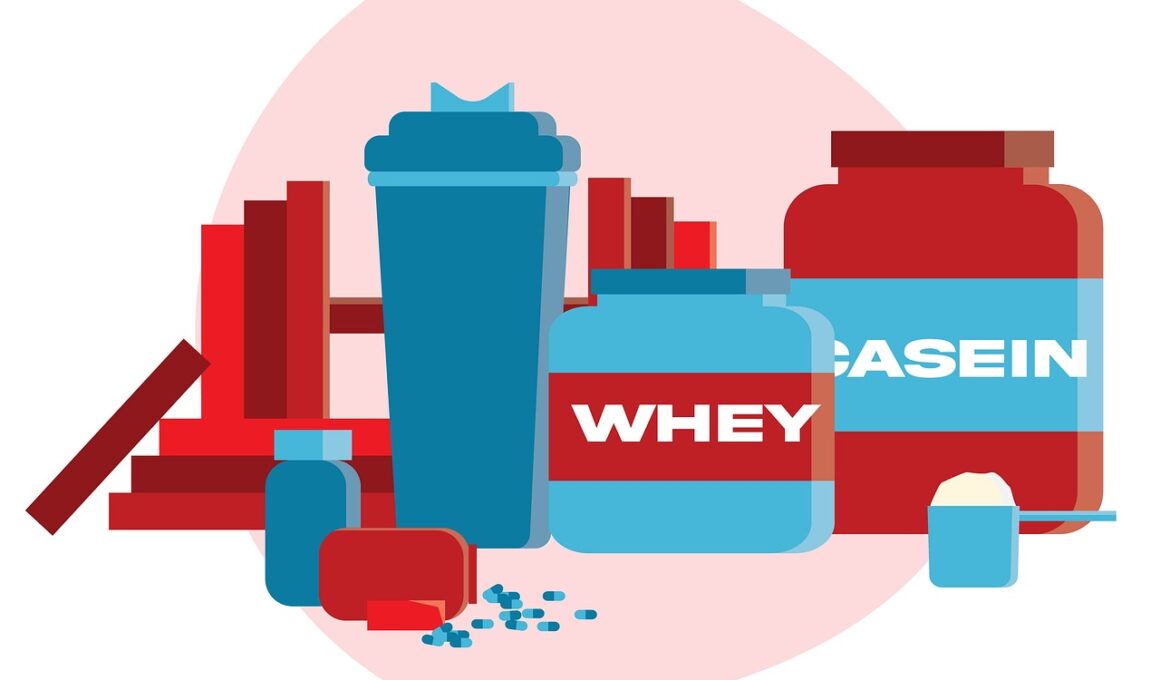The Impact of Protein Quality on Muscle Recovery
Protein is crucial for athletes seeking muscle recovery and growth, influencing their performance and overall health. Different protein sources vary in their quality, affecting how efficiently muscles can repair and grow. Quality of protein is determined by its amino acid profile, digestibility, and absorption rates. Complete proteins, which contain all essential amino acids, are vital for optimal recovery. For athletes, the timing of protein intake can also impact muscle recovery. Rapidly digestible proteins, like whey, are known to promote faster recovery when consumed shortly after exercise. Additionally, the source of protein plays a significant role; sources vary in their biological value. Plant-based proteins, while healthy, may offer fewer essential amino acids than animal proteins. It is essential for athletes to consider the type and timing of protein consumption, particularly post-workout, to ensure muscle recovery takes place effectively. Consuming high-quality protein post-exercise can help reduce muscle soreness and rebuild muscle fibers. Therefore, athletes should educate themselves on protein quality and strategize their meal plans accordingly to enhance recovery outcomes and improve performance.
Essential Amino Acids and Recovery
Amino acids, the building blocks of proteins, are pivotal in muscle recovery for athletes. There are 20 different amino acids, with nine classified as essential, meaning they must be obtained through diet. Essential amino acids play a significant role in muscle protein synthesis, helping repair muscle tissues damaged during intense workouts. Among these, leucine is vital due to its role in activating muscle recovery processes. Consuming protein-rich foods after exercise ensures an influx of these amino acids, promoting quicker recovery. Athletes should be mindful of their muscle protein breakdown and synthesis to optimize recovery periods. The rate of protein synthesis can affect recovery time and overall muscle development. A well-balanced intake of protein, particularly those providing essential amino acids, can rehydrate the body and refuel depleted energy stores. Some effective sources include dairy products, lean meats, and legumes. Additionally, supplements may help ensure proper amino acid intake, especially in individuals with dietary restrictions. Athletes who strategically incorporate amino acid-rich proteins into their diets may experience improved performance, stronger muscles, and faster recovery from physical strain.
In addition to complete proteins, the role of protein timing cannot be overstated in muscle recovery. It is essential for athletes to consume protein shortly after completing their workouts to maximize the recovery process. This post-workout period, often referred to as the “anabolic window,” is critical as muscles are highly receptive to nutrient intake. During this timeframe, ideally within 30 to 60 minutes post-exercise, the muscle cells facilitate greater protein uptake, promoting muscle repair and growth. Recommendations often suggest a combination of protein and carbohydrates during this recovery window for optimal results. Carbohydrates help replenish glycogen stores depleted during workouts, enhancing recovery efforts. Out of the various protein sources, high biological value options like whey protein are frequently recommended due to their rapid absorption rate. Additionally, athletes who find it challenging to meet their protein needs through whole foods might consider supplements, which can provide convenient options. Therefore, understanding when and what to eat post-exercise can significantly influence recovery outcomes and overall athletic performance in the long run.
Plant-Based Proteins and Their Role
Plant-based proteins have gained popularity, and their role in muscle recovery is increasingly recognized. Despite their generally lower biological value compared to animal proteins, plant-based proteins can still provide the necessary nutrients for muscle repair. Sources such as quinoa, soy, and lentils offer substantial protein content and are beneficial for athletes, particularly those following vegetarian or vegan diets. Furthermore, combining various plant proteins can enhance amino acid profiles, providing a more complete protein source. For instance, rice and beans together create a complementary profile rich in essential amino acids. Athletes can achieve their protein requirements from plant sources without compromising recovery needs. Although some may argue that plant proteins take longer to digest, awareness of proper combinations and timing can optimize benefits. Moreover, incorporating a diverse range of plant-based foods not only supports muscle recovery but also contributes to overall health. By embracing plant-based proteins, athletes can enjoy the added benefits of antioxidants and other nutrients. Hence, including higher quality plant proteins into recovery diets can lead to improved muscle function and enhanced athletic performance overall.
Nutrient timing extends beyond protein and involves carbohydrates, vitamins, and minerals that significantly influence recovery. Carbohydrates play a crucial role in replenishing muscle glycogen stores depleted after intense workouts. Therefore, athletes are encouraged to consume a balanced diet combining both protein and carbohydrates post-exercise. Incorporating whole-food sources can offer greater nutritional benefits, enhancing muscle repair and reducing soreness throughout recovery. Additionally, understanding the interplay of vitamins, such as vitamin D, and minerals like zinc and magnesium can support better recovery. These nutrients aid in reducing inflammation and muscle cramps. Antioxidants found in fruits and vegetables also contribute to muscle recovery while promoting overall health. Consuming colorful produce rich in antioxidants can improve immune function and combat oxidative stress caused by rigorous training. Therefore, adopting an all-inclusive approach to nutrition, emphasizing not just protein but an array of nutrients, can foster optimal muscle recovery. Athletes should plan their meals strategically to maximize nutrient absorption, encouraging better healing and improved performance. Thus, prioritizing a holistic nutrient intake can lead to enhanced energy levels and quick recovery following training.
Hydration’s Role in Muscle Recovery
Staying properly hydrated is equally essential for effective muscle recovery and optimal athletic performance. Water accounts for a significant portion of muscle tissue and is vital in physiological processes such as nutrient transport and thermoregulation. Dehydration can markedly reduce athletic performance, leading to longer recovery times and increased risk of injury. Consequently, athletes must prioritize adequate fluid intake before, during, and after exercise. While the focus is often on protein and carbs for post-exercise recovery, water should be part of these considerations. A general guideline suggests consuming 16–24 ounces of fluid for every pound of body weight lost during exercise. These fluids can aid the absorption of nutrients including protein. Electrolytes are also critical components of hydration, especially after strenuous activities. They help regulate muscle function and prevent cramping. Including drinks that provide electrolytes can enhance recovery for athletes engaged in long-duration events. Additionally, monitoring urine color can serve as an indicator of hydration status. Therefore, approaching recovery from a multifaceted angle ensures that hydration, alongside protein intake and nutrient balance, is prioritized, fostering quicker muscle recovery and improved performance.
To optimize muscle recovery, it’s vital for athletes to tailor their protein sources according to their individual needs and preferences. Each athlete has unique requirements based on their body type, fitness level, and training intensity. Personalized nutrition strategies can enhance recovery outcomes, helping athletes find specific protein combinations that work best for their bodies. Monitoring how different proteins affect recovery can also offer insights into dietary adjustments. Some athletes may thrive on a higher protein intake, while others may perform best with a more moderate approach. Additionally, experimenting with various protein sources can help identify what yields the best results. Emphasizing whole foods rich in protein can also lead to additional health benefits beyond sports. For example, proteins found in nuts and seeds contain healthy fats that support heart health. Athletes should strive to build a diet that not only meets their protein needs but also aligns with their overall health goals. In doing so, a focus on protein quality, body composition, and recovery strategies can help athletes maximize their performance while minimizing injury risks and downtime.
In conclusion, understanding the impact of protein quality on muscle recovery is vital for athletes committed to improving their performance and reducing injury risks. The variety of protein sources available offers unique advantages, but selecting high-quality, easily digestible proteins can significantly aid in muscle repair. Moreover, timing protein intake alongside other nutrients plays an essential role in optimizing recovery. Addressing hydration as a significant factor cannot be understated; without proper water intake, even the best protein strategies may fall short. Coaches and nutritionists need to work closely with athletes to develop personalized nutrition plans that focus on protein quality and overall nutrient balance. Furthermore, considering individual responses to different protein types is crucial for maximizing recovery and performance. Research continues to evolve, providing new insights into dietary strategies and the science of recovery. Hence, athletes should stay informed on the latest findings and adjust their plans in accordance with their experiences. This holistic approach to nutrition, recognizing the importance of protein quality and timing in muscle recovery, empowers athletes to achieve their goals and maintain long-lasting health.


